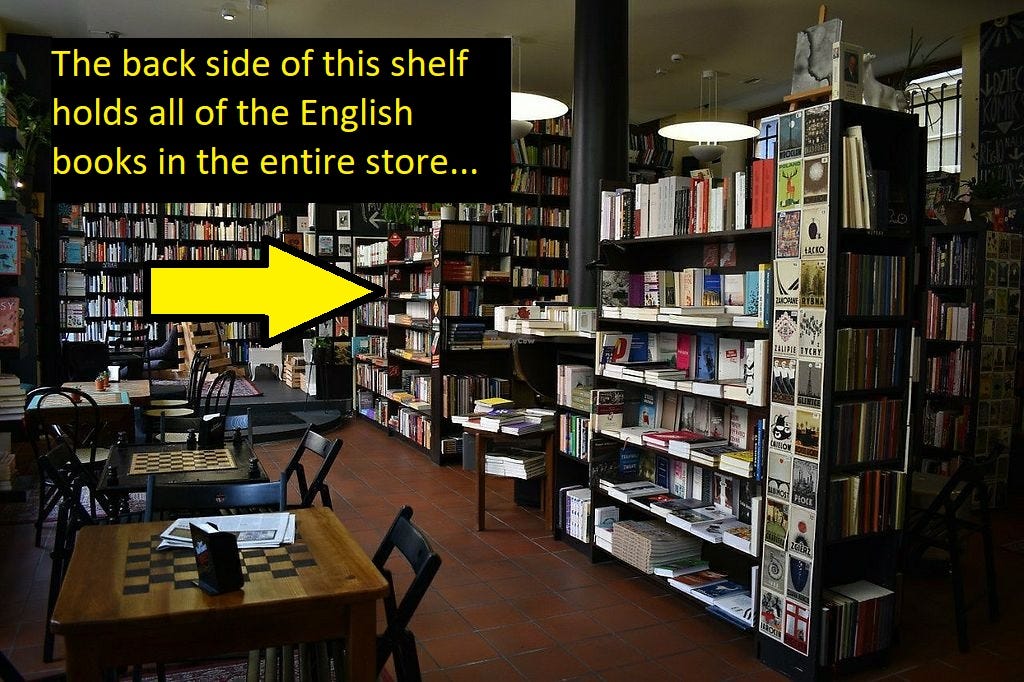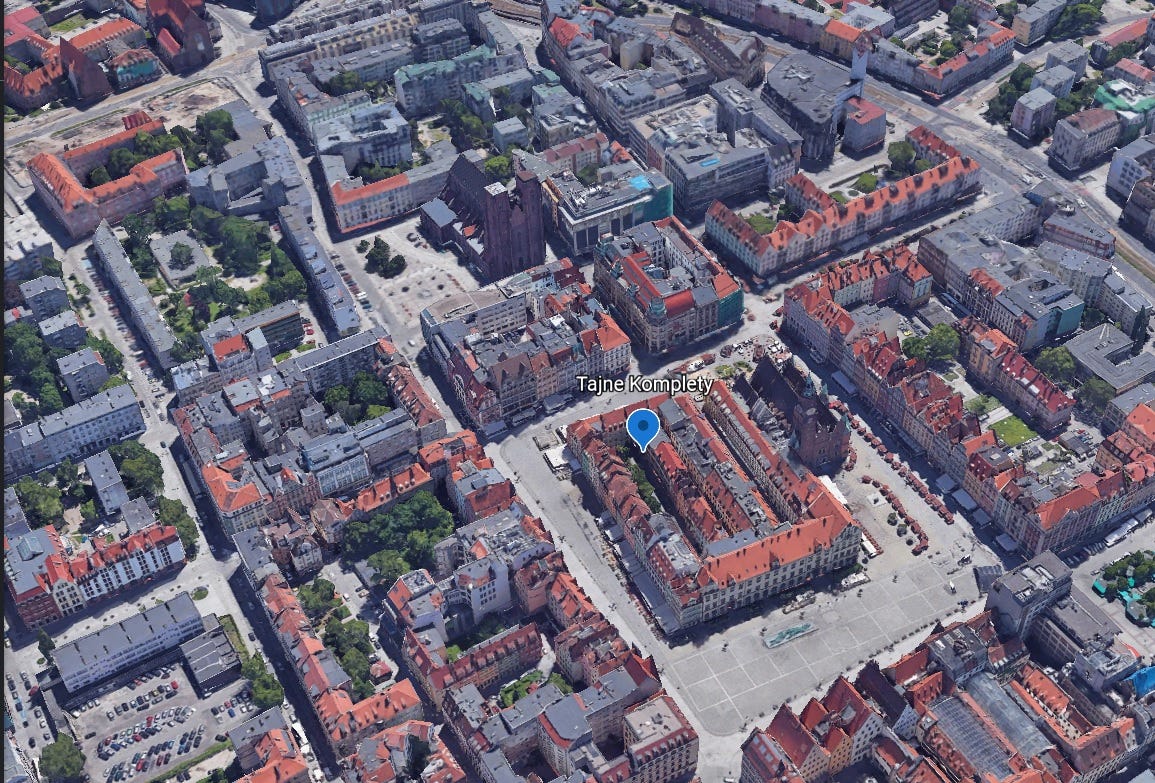As expected, the onset of the school year—especially a school year in a brand new upper secondary program, at a brand new upper secondary campus, teaching 4 courses using unfamiliar curricula, one of which (English language support class) I’m inventing from scratch—has pushed “Tom and Cathy’s Letters from Wrocław” ever closer to something that might be better titled “Tom and Cathy’s Increasingly Sporadic and Infrequent Letters from Wrocław.”
Life is still good in Wrocław. And despite the minor annoyances and frustrations that you can find in any city, or any job, I’m enjoying teaching as well. My colleagues are wonderful (it’s easy to build a sense of community with only 4 teachers, a counselor, and a principal), and so are the students. And of course I get to spend my days talking about writing and literature! (Not to mention the upcoming 3-day field trip to Berlin, which will merit its own post when the time comes).
But this letter isn’t about any of that. This letter is about practicing my Polish. (Bear with me—we’ll get there).
First, a look at Tajne Komplety (TIE-neh kom-PLET-eh), a cafe and księgarnia (k’shen-GAR-nyah)—bookstore—that happens to have two shelves of books in English. (It’s the only bookstore with any English books in Wrocław, I think):
The name translates to something like “Secret Sets.” It’s about a 20-minute walk from our apartment, right in the center of the rynek (town square):
(Google Earth has gotten all fancified and 3D!) The view above has północ (POO-notes)—north—at the lower left-hand corner of the photo.
In fact, following that street north to the corner of the photo and beyond is the most direct route home—and in the upper right corner, that street becomes “Swidnicka,” which some readers might remember as the subject (and title) of an earlier letter. Keep walking south—południe (po-WUDE-n’yeh)—along that street and in 25 minutes you’ll be at my school.
You can also see the Church of St. Mary Magdalene just east—wschód (f’s’HOOT, with the polish breathy W that’s almost like an Arabic “kh”)—of the rynek, near the center of the photo. That church is the site of the Most Czarovnic (mohst cha-ROVE-neets), or Witches’ Bridge, which was introduced in “Odds and Ends” a while back, when Cathy, Renton, and I climbed the 23,632 steps to the base of the spires. (Digression alert… oops. Too late.)
Back to practicing Polish. Yesterday being the first day of the weekend—pierwszy dzien weekendu (PEERF-shih jin veek-END-oo)—I managed not one, but two visits to Tajne Komplety. (Walking around the city is still the main activity for leisure time, so why not walk to a bookstore?) I decided we had room for one more book, now that I’ve added Kafka on the Shore to my classroom library. But which book?
A collection of essays by Umberto Ecco? A copy of Catcher in the Rye or On the Road? A murder mystery set in 1920s Breslau (i.e. Wrocław), translated from the original Polish? Hmm… In the end I opted for nonfiction: Paul Collier’s The Future of Capitalism, which reviewers described as “a deep exploration of the ethical institutions underlying our market society” and a vision of “an alternative to the divisions tearing apart so many western countries” (sound familiar, USA?).
I enjoyed a pleasant late-afternoon walk home, in a fine drizzle that put a chill in the air and collected on the streets in impressionistic puddles, Monet trading in his waterlilies for cobblestones.
Another digression:
Our landlord recently removed the fancy electronic lock on our apartment door for repairs. So for now we have to use the actual physical key to lock (or unlock) the door.
A key which I put securely into the pocket of my jeans when I went out to Tajne Komplety. And which, now that I had arrived back home (with an armful of przekąski (p’sheh-KONES-kee)—snacks—from the Żabka across the street, was no longer in my pocket.
Leaving moje przekąski (MO-yeh p’sheh-KONES-kee)—my snacks—outside the door (with the exception of the pint of Oreo ice cream I’d purchased), I set out to retrace my steps, planning to practice my Polish anywhere the key might have dropped out of my pocket. The ice cream? I ate a few scoops along the way, using the lid as a spoon, and then—the horror!—discarded the rest in a trash can, or kosz na śmieci (kohsh nah shmee-ETCH-ee), literally “basket for garbage.”
“Przepraszam—słabo mówię po polsku. Bardzo słabo.”
(P’sheh-PROSH-om—SWOB-oh MOOV-yeh poh POLES-koo. BARD-zoh SWOB-oh)
Excuse me—I speak Polish poorly. Very poorly)
“Ale, zgubiłem mój klucz.
(AH-leh, z’goo-BEE-wem moo-ee KLOOTCH).
But I have lost my key.
Widziałeś tutaj klucz?
(veed-see-OW-wesh TOO-tai klootch)
Have you seen a key here?
“Jeden klucz?”
(YED-enn klootch)
One key?
I had my first practice session at the Żabka. “Widziałeś tutaj klucz?” The answer, tragically: no.
Twenty minutes later, I had my second practice session at Tajne Komplety. I must have said something at least suggestive of the general meaning intended, because the clerk immediately held up my key.
“Dziękuje bardzo!”
(jen-KOO-yeh BARD-zoh)
Thank you very much!




Glad you found your keys in Tajne Komplety!
By the way, while the literal translation of Tajne Komplety indeed is something like "complete sets", this phrase has a deeper meaning. During WW2 and under the German occupation, high school and college education was forbidden for Poles. But there was a secret, underground network of teachers who would meet with students in private apartments to teach them advanced maths, Polish language, history and other classes. Even some universities operated in that manner. These secret teachings were called tajne komplety. Wikipedia has an interesting article on the subject: https://en.wikipedia.org/wiki/Education_in_Poland_during_World_War_II
I believe the owners of the bookstore probably meant that when they named their business.
Did I miss an explanation of Breslau vs Wroclaw? Is it the same city?